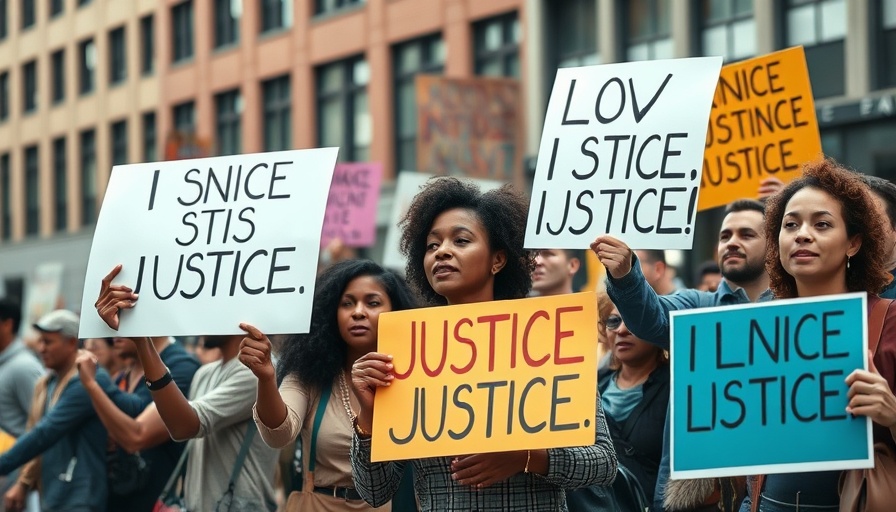
Understanding the Shift: Federal Oversight of Police Under Threat
The recent news that the Trump administration may abandon federal oversight of police departments marks a significant shift in public safety policy, particularly for agencies that have faced accusations of systemic civil rights violations. With a focus on federal collaboration to push for necessary police reforms, the status of oversight agreements now hangs in the balance, sparking concern among community advocates and stakeholders.
The Impact on Police Oversight
Federal oversight, particularly through consent decrees, has historically facilitated necessary reforms in police departments across the United States. Cities like Louisville and Minneapolis, which agreed to consent decrees following investigations into their police practices, now face uncertainty. In Louisville, for instance, the agreement required officers to adopt appropriate de-escalation tactics and investigate misconduct allegations thoroughly. However, with reports that the Trump administration aims to halt these oversight efforts, the accountability structures that have been set in motion could be jeopardized.
Community Implications: Voices from the Ground
For community leaders and civil rights advocates, this potential policy change isn't merely bureaucratic; it directly impacts policing on the ground. Activists are voicing fears that without federal intervention, many police departments will revert to practices of excessive force and discrimination that can violate the rights of marginalized communities. For example, the Lexington Police Department in Mississippi, which has been under scrutiny for allegations of brutality against Black residents, may no longer be compelled to adhere to reforms that aim to protect citizens from mistreatment.
Historical Context: The Evolution of Police Reform
The rollback of federal oversight signifies a dramatic shift from the Obama administration's focus on holding police accountable through legal frameworks designed to enforce reform. Historical analysis indicates that concerted federal efforts, such as investigations and subsequent consent decrees, have been vital in cases where local leaders failed to recognize and address misconduct. Since the George Floyd and Breonna Taylor episodes, the dialogue on police reform has motivated activism on the ground, which is now met with resistance at the federal level.
Technological Advancements and Accountability
In an era of increasing technological oversight through tools like body cameras and public safety data analysis, skepticism about the ability of local departments to self-regulate without federal oversight is palpable. Activists warn that without formal mandates, many departments may ignore transparency initiatives such as recording and releasing body camera footage when misconduct occurs. Advocating for consistent implementation of policies that ensure community safety has never been more critical, particularly during this moment when federal leadership is reconsidering its role.
Building Community Trust: A Necessary Discussion
Perhaps the most significant consequence of abandoning federal oversight could be the erosion of trust between communities and law enforcement. Police-community trust strategies, which are vital for effective policing, risk being undermined without a federal commitment to accountability. Law enforcement leaders must realize that the credibility of policing in America hinges on their willingness to engage with communities on issues of discrimination, excessive force, and adequate responses to crisis situations.
Looking Ahead: Strategies for Reform
As the future of federal oversight remains uncertain, stakeholders must proactively seek out community policing strategies to foster better relationships between law enforcement and the public. Officers trained in crisis intervention, equipped with procedural justice strategies that respect individual rights, play a pivotal role in forming these new partnerships. Emphasizing officer wellness and supporting innovative recruitment strategies are also crucial for rebuilding public trust.
Final Thoughts: What to Watch For
The implications of the Trump administration's proposed policy changes on federal oversight of police reform will unfold in the coming months. Observers and activists alike should remain vigilant, advocating for transparency, accountability, and community safety as policing practices continue to evolve in this challenging landscape. Community leaders must engage with local police more than ever to ensure that reform is pursued aggressively, irrespective of federal involvement.
As community members, advocates, and police officers navigate this complex situation, it's essential to stay informed and involved. Engaging in dialogue with local leaders about police reform strategies can help bridge the gap between law enforcement and community expectations, thereby nurturing trust and cooperation for a safer future.
 Add Row
Add Row  Add
Add 

 Add Element
Add Element 




Write A Comment